
To prevent the worst impacts of climate change, the world needs to limit global warming to 1.5°C above pre-industrial levels. Reaching net zero carbon emissions is essential to achieving this.
We are taking steps to accelerate the reduction of our carbon and waste footprint. We also champion the shift to a lower carbon future among our communities. Since our purpose is to foster human progress through knowledge, we also support climate science through our publishing. We call our approach ‘Faster to Zero’. Together we can all make a difference to the planet.
Our Faster to Zero commitments
We are reducing the emissions associated with our business as far and as fast as possible. We do this by being more efficient with energy consumption and by using renewable electricity. We also take steps to reduce the carbon footprint across our supply chain. Where emissions are unavoidable, we purchase high quality carbon offsets.
We commit to:
- Become carbon neutral as a business and across our products by the end of 2025
- Halve the waste generated through our products between 2020 and 2025
- Become zero waste and net zero carbon by 2030 or earlier.
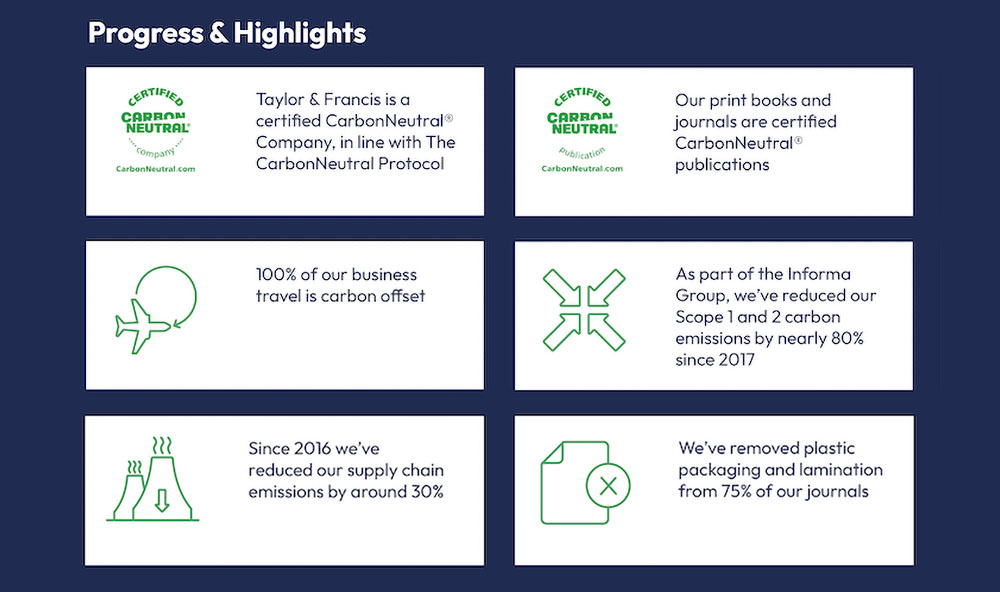
Our progress and highlights
We have already delivered significant progress on our commitments. Highlights include:
- CarbonNeutral certification. We have been a certified CarbonNeutral® Company since 2020. We have also achieved CarbonNeutral® publication certification for all our print books and journals.
- Emissions reduction. As part of the Informa Group, we reduced our Scope 1 and 2 greenhouse gas emissions by 83 percent between 2017 and 2023.
- Plastic-free. We have removed plastic packaging and lamination from over 75 percent of our journals.
- Sustainable travel. 100 percent of our business travel is carbon offset.
Our recognitions and achievements
As part of the Informa Group, our sustainability strategy and performance is regularly evaluated by independent research agencies, analysts, and partners. We are proud to be a top performer in many sustainability performance indices. These include:
- FTSE4Good. We are a FTSE4Good Index Series member. This recognizes our strong environmental, social, and governance (ESG) practices.
- CDP. We have an A- ranking for our environmental impacts and disclosures on environmental performance.
- Dow Jones Sustainability Index (DJSI). We are a DJSI Sustainability Yearbook Member, and are ranked second out of 264 companies in our sector.
- Sustainalytics. We have an ESG risk rating of 9.3 (negligible sustainability risk).
- ISS ESG. We are ranked in the top 10 percent of our industry by ISS ESG.
- MSCI. We have an AAA ESG rating from MSCI, the highest possible.

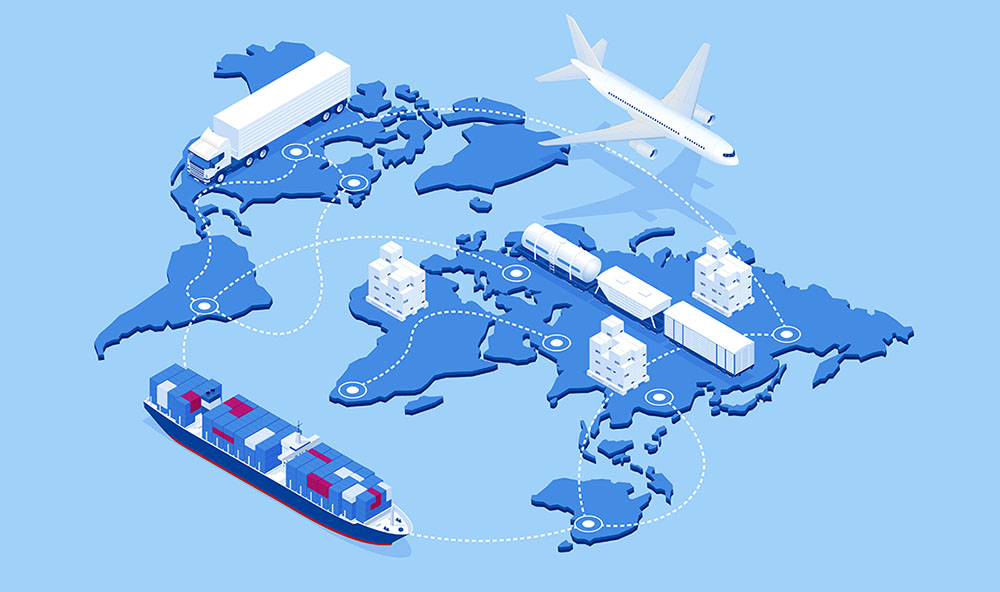
A sustainable supply chain
Over the past decade we have created a far more efficient and sustainable print supply chain. We have reduced our carbon emissions by over 30 percent. Our actions include:
- Increased use of print-on-demand (POD). This means we can reduce physical stock levels.
- Expanded opportunities for customers and resellers to self-print.
- Growth of our digital offerings of books and journals. We have switched select journals to digital only format.
- Donations of unused book stock to BookAid and Amnesty International. This avoids waste and helps share knowledge.
- Removal of plastic packaging and lamination from most of our printed journals.
Responsible sourcing
Our commitment to creating a responsible supply chain includes the materials we use, the suppliers we partner with, and the workers within our value chain. To ensure high ethical standards, we use the following:
- Standards. All suppliers agree to adhere to the high standards set out in our Business Partner Code of Conduct.
- Certification. We only work with printers that can provide proof of using paper from certified responsible sources.
- Preferred suppliers. We prioritize working with suppliers that can demonstrate sustainability progress, and who are working towards net zero carbon emissions.
- Due diligence. We maintain close relationships with our suppliers. We use annual in-person visits and third-party labor audits as part of our due diligence process.
- Data. We are active members of the Book Chain Project. We regularly use their data to continue to make informed decisions about our supply chain.
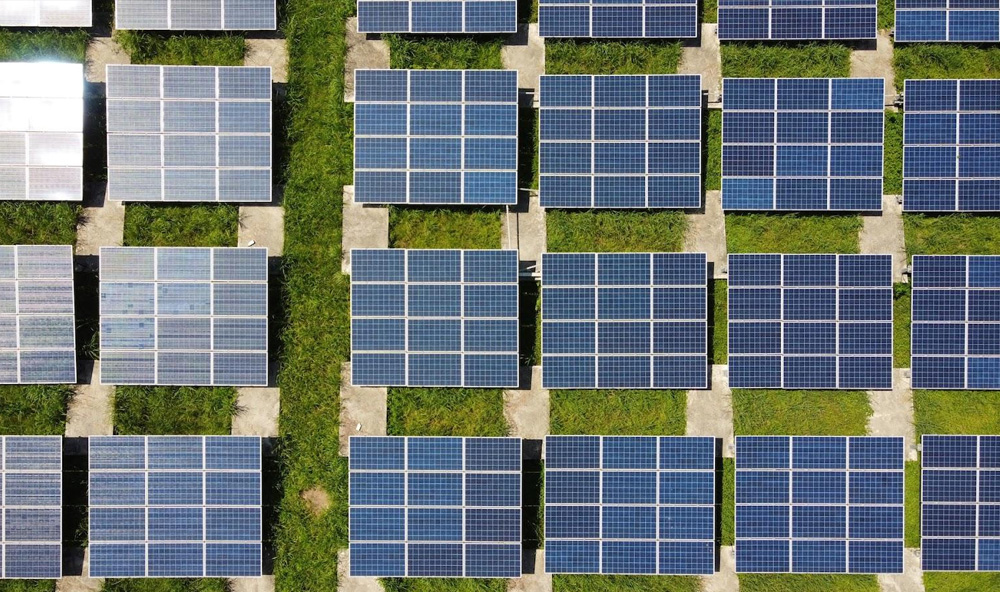
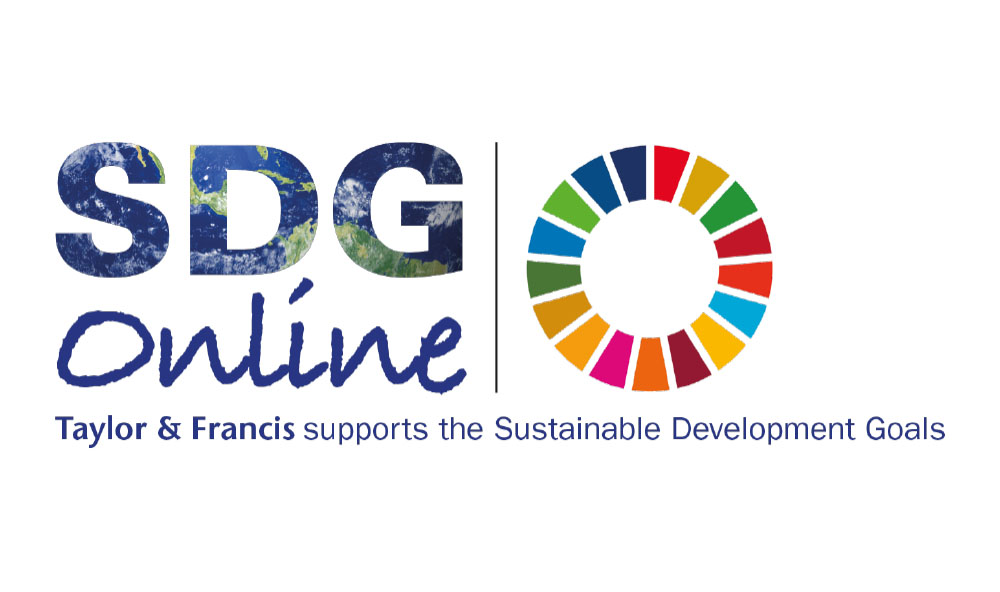
Carbon offsets
The remaining carbon emissions from our printed products and supply chain are compensated for through the purchase of carbon offsets. These support carbon reduction or removal projects around the world. They also support other UN Sustainable Development Goals (SDGs). This includes those relating to health, wellbeing, conservation, and poverty eradication.
We measure emissions from the production of the paper we use, the energy used to manufacture our books and journals, the impact of our digital content, and the emissions from transporting products to customers. This helps us to target the areas in our supply chain where we can continue to make changes. These changes will help us become a net zero carbon business by 2030.
Our commitment to climate action
We are proud to be a founding signatory of Publishing Declares. This is the UK Publishers Association’s Climate Action Pledge. Launched in 2021, it has over 200 signatories so far. We are also members of the Publishers Association Sustainability Group. This was formed in 2020 to accelerate sustainability actions in the industry.
In addition, we are signatories to the SDG Publishers Compact. This UN initiative launched in 2020, in collaboration with the International Publishers Association. It aims to accelerate progress toward the 17 UN SDGs by 2030. Signatories aspire to develop sustainable practices and act as champions of the SDGs. As part of our commitment, we publish books and journals that will help inform, develop, and inspire climate action.
Visit our Sustainability Hub to read more about how we are becoming a more sustainable, positive impact business.
Visit our sustainability hub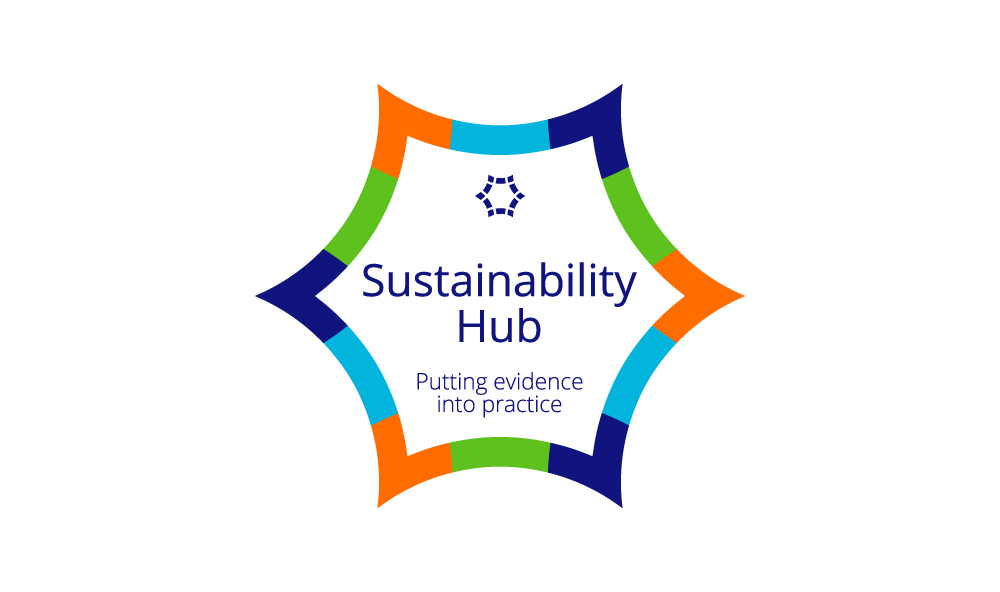
 Africa
Africa  China
China  Japan
Japan 

